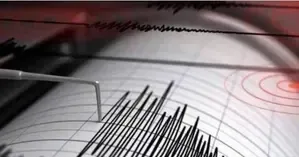What Happened When Greece Experienced a 6.0 Magnitude Earthquake?

Synopsis
Key Takeaways
- 6.0 magnitude earthquake struck off Crete.
- Tsunami warning issued by European authorities.
- Tremor felt across Crete and nearby islands.
- Authorities on alert for possible aftershocks.
- Greece is one of the most seismically active regions in Europe.
Athens, May 22 (NationPress) A 6.0 magnitude earthquake occurred off the coast of Crete, Greece, on Thursday, as reported by the German Research Centre for Geosciences.
This seismic event led to the issuance of a tsunami warning by European authorities. The quake struck at 6:19 a.m., located 58 km north-northeast of Elounda in northeastern Crete, with a depth of 60 km according to preliminary data.
So far, no injuries or damage have been reported, but the tremor was widely felt throughout Crete and nearby islands, alarming local residents.
Following this, several aftershocks were recorded, prompting the fire services in Crete to remain on high alert.
In an interview with national broadcaster ERT, Efthimios Lekkas, president of the Earthquake Planning and Protection Organisation, indicated that the earthquake's epicenter was likely in the sea.
Greece is situated on significant fault lines and is known for its frequent seismic activity, being one of the most seismically active regions in Europe, positioned along the intricate fault boundary between the African and Eurasian tectonic plates.
Earlier on Monday, schools in a region of Evia Island were closed as a precaution after a series of earthquakes rattled the area over the weekend.
The National Observatory of Athens reported at least three tremors, with magnitudes ranging from 4.1 to 4.5 on the Richter scale, recorded since Sunday, accompanied by numerous aftershocks. The epicenter was identified in central Evia, near the village of Prokopi.
The strongest quake, measuring 4.5 in magnitude, was felt in the Greek capital, Athens, approximately 80 km to the south, as reported by Xinhua news agency.
According to Giorgos Tsapourniotis, the mayor of the Mantoudi-Limni-Agia Anna municipality, the tremors caused damage to at least 20 houses, shops, and a monastery.
Additionally, another earthquake struck Greece on May 13 with a magnitude of 6.1, according to the US Geological Survey (USGS).









